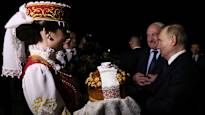Russia has started a new, even stronger Russification project in Belarus, as a result of which the Belarusian language is in danger of disappearing.
This is what a Belarusian-German researcher says Alexander Friedman. He has followed the development of his country’s language policy from Düsseldorf, Germany for more than 20 years, and recent developments worry him.
– The wave of Russification can now be seen everywhere in Belarus, the historian says.
In September, the news agency AP told about the 15-year-old from Mikalaywho was surprised when the school staff started calling him by his new name. The teachers at Mikalay’s place had started addressing the young man as Nikolai, that is, using the Russian version of the name Mikalay.
According to the researcher, the phenomenon is a logical continuation of a longer-term development.
The pace of Russification has accelerated
Russia began to expand its economic, political and cultural power in Belarus in 1994, when Alexander Lukashenko came to power.
– At the end of the 1990s, the names of Belarusians in passports were Russianized for so-called practical reasons. Citizens were told that uniform names would make it easier to travel to Russia.
Since then, the rate of Russification has accelerated and spread throughout society, the researcher states.
Today, only less than nine percent of Belarusian students receive instruction in their mother tongue. Back in the 1990s, the number was 40 percent.
Friedman remembers how in the late 1990s he studied history at the Belarusian State University. According to the researcher, it was then possible to study the entire degree in Belarusian.
– Today it is not possible. The Belarusian language is studied only in primary school. If you want a university degree, you have to complete it in Russian.
Belarus drifted into Russia’s sphere of influence
Both Belarusian and Russian are East Slavic languages. However, the vocabulary of Belarus differs considerably from that of Russia.
Belarus has a long history as part of the Grand Duchy of Lithuania and the Kingdom of Poland. In the 18th century, Belarus became part of the Russian Empire and later became part of the Soviet Union.
After the collapse of the Soviet Union in the 1990s, Belarus experienced a strong national awakening. The same thing happened in Ukraine.
Both countries were interested in the opportunities offered by the West, but the Russian administration saw the rapprochement of Ukraine and Belarus with the West as a threat to itself.
At the end of the 1990s, Russia started to establish pro-Russian organizations, educational programs and cultural projects in Belarus and Ukraine. The Kremlin also supported pro-Russian politicians.
Unlike Belarus, Ukraine actively sought to prevent Russian interference in the affairs of the independent state. The situation escalated in 2022, when the president Vladimir Putin launched a major invasion of Ukraine.
According to Friedman, Russia is now doing in Belarus what it failed to complete in Ukraine.
– Russia has practically made Belarus its vassal state. Putin dictates the internal and security policy of Belarus. Russia has even taken its troops and missiles to the soil of Belarus and is using the country as a base for its attack on Ukraine, the researcher says.
The Kremlin has taken the pro-Russian President Lukashenko under its protection. Russia supported Lukashenka when the Belarusian opposition organized large demonstrations against the president and election fraud in 2020.
According to Friedman, all this also affects language.
– Lukashenko openly despises the language and culture of his country. He has said that nothing significant can be expressed in Belarusian. He only considers Russian and English to be strong languages, Friedman explains.
During his more than 30-year presidency, Lukashenka has, among other things, made Russian an official language alongside Belarusian and renounced the national symbols of Belarus.
Belarusian became the language of the opposition
After the 2020 protests, Lukashenko has considered the Belarusian language and strong Belarusian nationalism as threats to the continuation of his power.
One of the reasons for this is that Belarusian has become the language of the opposition.
The opposition adopted the Belarusian language and the country’s old white-red flag as their symbols. They played a key role in the mass protests of 2020, which were violently suppressed by the Belarusian regime.
That is why the president has made it more and more difficult to use Belarusian, the researcher explains.
For Friedman, like many ordinary Belarusians, own language is a matter of pride. Nevertheless, the use of the Belarusian language is decreasing.
Only on the borders with the Baltic states and in rural areas, Belarusian is still spoken more than Russian.
According to Friedman, official matters must be handled in Russian these days. Almost all media is also in Russian. Government officials use Russian in their work, and Lukashenko speaks mostly Russian in public.
UN Special Rapporteur on human rights in Belarus Anaïs Marin has statedthat Lukashenko’s administration discriminates against Belarusian speakers.
Friedman, a researcher living in Germany, has also observed the same.
– For example, many experts do not dare to speak Belarusian for fear of discrimination.
Although the language continues to fade under the current administration, Friedman doesn’t think it’s going away completely.
He is also hopeful.
– The Belarusian language would recover quickly if democratic forces came to power, says Friedman.
